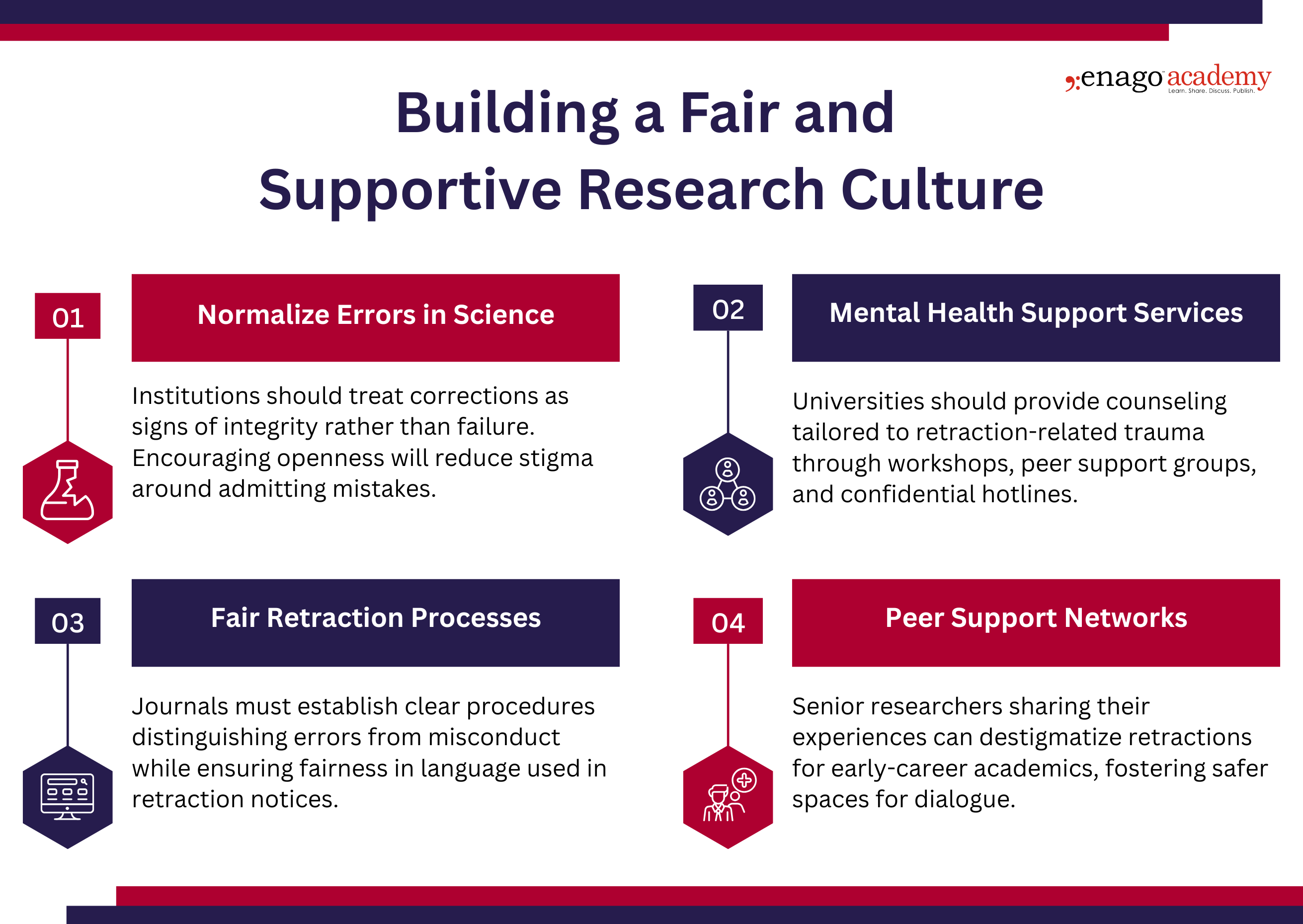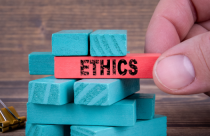Supporting Minds Behind the Science: Retractions, resilience, and researcher well-being

In 2002, only 1 in 5,000 papers were retracted, but by 2023 that number had risen to 1 in 500, according to Ivan Oransky, co-founder of Retraction Watch.
“Statistically speaking, there is a not-zero chance that one of the papers you’re citing has been retracted. That’s pretty significant.”
-Ivan Oransky, Co-founder Retraction Watch
This dramatic rise highlights why retractions remain a sensitive issue—not just for scientific integrity, but for the personal and professional lives of those involved. As emphasized in a recent editorial in Journal of Mental Health, retractions can lead to intense psychological distress, stigma, and isolation for authors, underscoring the urgent need to address their mental health alongside institutional responses.
Retractions are more than corrections to the scientific record—they can feel like personal and professional earthquakes. For researchers, academic work is not just output; it’s identity, credibility, and a future. So, when a paper is retracted, the blow goes far beyond the data.
Even in cases stemming from honest mistakes, the stigma can be damaging—especially for early-career academics. It can unravel careers, erode confidence, and trigger profound emotional distress, anxiety, shame, and isolation. The pain is often compounded by the public response to retractions.
This article dives into the emotional aftermath of paper retractions and explores what journals, institutions, and the wider research community can do to foster a more compassionate and resilient research culture.
The Emotional Fallout of Retractions
The pressure to produce results, rather than to prioritize the research journey discourages honest conversations about mistakes and integrity. This blame-oriented environment perpetuates mental health struggles and stifles growth. Here are some common emotional responses researchers experience:
- Researchers often equate their publication record with their professional worth. As a result, retractions feel like a professional failure, leading to intense shame.
- The fear of potential retractions creates hyper-vigilance, contributing to academic burnout and sleep disturbances. Additionally, fear of being blamed discourages openness about errors.
- Colleagues may distance themselves from affected researchers, reinforcing isolation.
- Retractions can intensify self-doubt, leaving researchers questioning their competence and place in academia, ultimately leading to “imposter syndrome”.
 Behind Retractions: Real-life tales of some researchers
Behind Retractions: Real-life tales of some researchers
Let’s look at real cases where researchers faced retraction and had different outcomes depending on the support they received.
1. Transparency and Redemption
Pamela Ronald, a plant geneticist at the University of California, Davis, and her team faced a major setback in 2013 when they had to retract two high-profile papers published in Science. The studies initially identified a protein that triggered rice’s immune response to bacterial infection, promising advancements in engineering disease-resistant crops. However, the findings could not be replicated due to a mislabeled bacterial strain and a highly variable assay.
The Response:
Ronald took immediate action by retracting the papers and publicly explaining the errors. She demonstrated transparency, which helped her earn praise for integrity. Her lab implemented rigorous changes, including:
- Adopting electronic lab notebooks.
- Requiring all materials to be genotyped before use.
- Instituting stricter controls over experimental tools.
The team spent months redoing experiments with improved protocols, eventually publishing corrected findings in Science Advances. This process reaffirmed their commitment to scientific accuracy.
Impact on Mental Health and Career
The experience was emotionally taxing for Ronald and her team, who felt like they had failed in the scientific process. However, community support played a crucial role in their recovery. Strangers sent letters of encouragement, helping them sail through the difficult times. A postdoc who joined her lab after the incident expressed admiration for Ronald’s integrity and became instrumental in subsequent successes.
Ronald’s case is often cited as a model for handling honest errors with accountability and resilience. She has since advocated for reducing stigma around retractions, arguing they should be viewed as a part of science’s self-correcting measure rather than as failures.
2. Struggles with Stigma
Jaime Evaristo, an early career ecohydrologist, faced a painful retraction of a Nature paper that examined how forestry practices affect streamflow. The retraction stemmed from fundamental flaws in the data and methods, which were identified in a critique posted as a preprint. Although the errors were unintentional, the fallout was severe.
The Response
Evaristo initially attempted to defend his work by drafting corrections but ultimately decided to retract the paper after peer reviewers confirmed the gravity of the mistakes. He described the experience as humbling but necessary to uphold scientific integrity.
Impact on Mental Health and Career
The retraction led to intense public scrutiny, including harsh criticism on social media and anonymous peer reviews. Evaristo struggled with self-esteem issues and withdrew from academic events to safeguard his mental health. Despite his department head rejecting his resignation offer—acknowledging that the errors were honest, he found it difficult to recover. Furthermore, he faced challenges publishing further studies. Funding applications were repeatedly denied, even the ones unrelated to the retracted study.
Nevertheless, Evaristo remains committed to transparency, emphasizing that open data practices are essential for academic integrity. He views retractions as opportunities for growth but acknowledges the lasting impact they can impose on researchers.
3. Misconduct and Systemic Issues
Olivier Voinnet, a prominent molecular biologist at ETH Zurich and CNRS (Centre National de la Recherche Scientifique), became infamous for multiple retractions involving manipulated images in his publications. By 2015, Voinnet had seven retracted papers, including one highly cited study on gene silencing mechanisms in plants. Although not personally responsible for all instances of misconduct, Voinnet was held accountable due to supervisory lapses.
The Response
Initial corrections were issued for some papers when image duplication was discovered; however, further investigations revealed additional manipulations. This led to complete retractions. The fallout from the investigations had significant professional and reputational consequences for Voinnet. He was suspended for two years without pay by CNRS, effectively barring him from returning to work at the institution. This marked a severe penalty for his failure to uphold scientific standards. ETH Zurich extended a formal warning against Voinnet for five years due to his organizational and management shortcomings.
Impact on Mental Health and Career
The stigma surrounding Voinnet’s case extended beyond professional consequences. Members of his lab were redistributed to other research groups at ETH Zurich following the scandal. This restructuring disrupted his collaborative network. Some members of the scientific community openly criticized both Voinnet and the institutions involved for their handling of the case. This public condemnation added to the stigma he faced. Despite these issues, Voinnet retained his position at ETH Zurich. He continued receiving European Research Council (ERC) funding and resumed publishing in high-impact journals after serving sanctions.
While Voinnet’s case highlights individual lapses, it also underscores systemic issues within academic research:
- The hypercompetitive nature of academia may incentivize unethical practices.
- Institutions often fail to implement robust safeguards against misconduct
- Investigations into high-profile researchers can be influenced by institutional interests, leading to perceptions of leniency.
Ultimately, his case serves as both a cautionary tale about leadership accountability in research groups and a reminder of how retractions can profoundly affect researchers even when they are not directly guilty of misconduct.
The Importance of Institutional Response to Retractions
These stories reveal that while retractions are challenging, they also offer growth opportunities—provided they are handled with empathy and fairness by institutions and the broader scientific community.
Universities and research institutions play a central role in either breaking or building a researcher’s resilience during retractions. When institutions:
- Only punish, without investigating the full context
- Fail to differentiate between types of errors
- Offer no mental health resources
they add to the damage already caused by the retraction itself.
Instead, institutions should:
- Create retraction response protocols that include counseling and mentoring.
- Establish independent review panels to ensure fair investigations.
- Offer mental health resources tailored for researchers dealing with high-stress events like retractions.
The Need for Compassion and Clarity in Journal Retraction Policies
Journal policies also contribute to the researcher’s experience during a retraction. Many journals do not publish clear reasons for retractions, leaving room for speculation and rumors. Lack of transparency can amplify shame and anxiety.
The Committee on Publication Ethics (COPE) provides clear guidelines that journals should follow when issuing retraction notices. According to COPE, retraction notices must be clearly identified as such, state who is retracting the article, and outline the specific reasons for the retraction to help readers understand why the work is unreliable. These guidelines ensure transparency and maintain the integrity of the scholarly record.
What journals can do better:
- Clearly state the reason for retraction (e.g., honest error vs. fraud).
- Avoid sensational language that may cause reputational harm.
- Provide anonymized case studies to educate the community and normalize error correction.
The Power of Peer Support
Sometimes, the most impactful support comes from fellow researchers. A peer who says, “I’ve been through that too” can be more reassuring than an institutional email.
Building peer support networks within labs, departments, and professional societies can:
- Reduce isolation
- Encourage open conversations about errors
- Promote a more forgiving and realistic view of science
Even online communities or anonymous platforms can offer comfort when researchers feel alone in their experiences.
Shifting Toward a Healthier Research Culture
The current system often frames retractions as personal failures. But science, by its nature, is built on trial and error. It’s time for the research community to adopt practices that reflect this reality. The infographic below shares four concrete steps to move forward:
 Scientific retractions serve a crucial role in correcting the academic record. But the human cost behind them is often overlooked. Researchers are not machines— they are individuals facing immense pressure. And like all people, they need support, empathy, and systems that focus on improvement rather than punishment.
Scientific retractions serve a crucial role in correcting the academic record. But the human cost behind them is often overlooked. Researchers are not machines— they are individuals facing immense pressure. And like all people, they need support, empathy, and systems that focus on improvement rather than punishment.
If you or someone you know is struggling with the mental health impacts of retraction or academic pressure, you’re not alone—and support is available. Organizations like PhD Balance, Dragonfly Mental Health, and Thrive in Academia offer resources, peer communities, and guidance tailored for researchers. General mental health support from groups like the UK’s Mind can also be a helpful starting point. Seeking help is a sign of strength, not failure—and it’s okay to prioritize your well-being alongside your work. Normalizing these conversations and highlighting accessible resources can make a meaningful difference for anyone struggling in the aftermath of a retraction.
To build a healthier research culture, we must normalize mistakes, create transparent processes, and ensure mental health support is baked into institutional responses. Protecting the integrity of science should never come at the cost of the scientists themselves.









